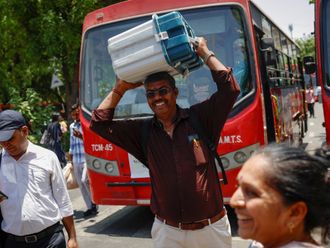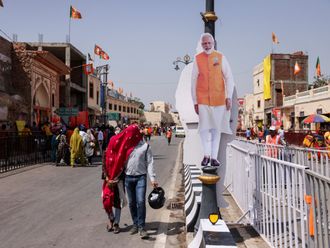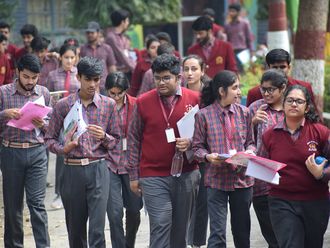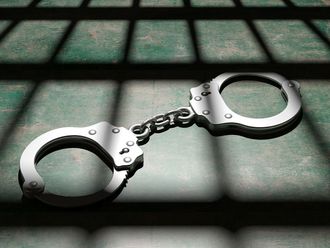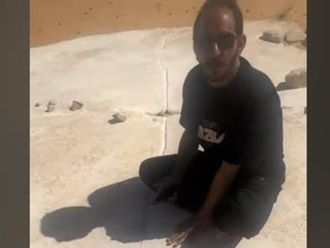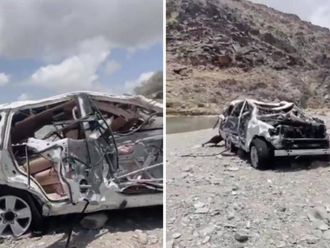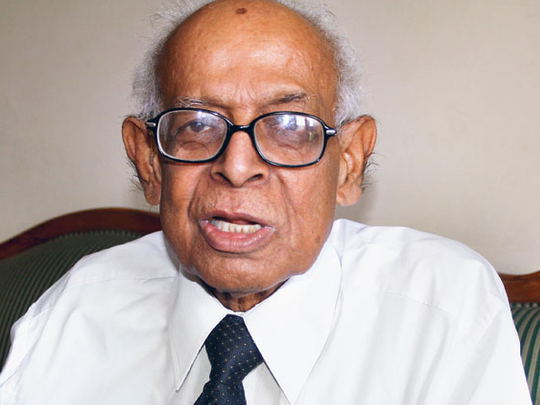
New Delhi: Syed Shahabuddin, Member of the All India Muslim Personal Law Board's Babri Masjid Committee, is its most familiar face. Not one to mince words, he has often been referred to as a volatile and misunderstood person, despite his contribution in various fields.
A lecturer-turned diplomat, he served as an ambassador and a government official, who at the time of seeking premature retirement, was Joint Secretary in charge of Southeast Asia in the Ministry of External Affairs. Having entered politics in 1979 he joined the Janata Dal and was a Member of Parliament for three terms until 1996.
Shahabuddin heads the All India Muslim Majlis-e-Mushawarat (AIMMM), one of the Muslim groups in the All India Muslim Personal Law Board (AIMPLB).
He speaks to Gulf News in an exclusive interview.
GULF NEWS: You are not happy with the High Court verdict. Had it gone in favour of the Muslim community, would you have felt relieved? Or anxious about the move by the Hindus?
SYED SHAHABUDDIN: I am not satisfied with the verdict and we have decided to appeal in the Supreme Court. But if the result had gone in our favour, I would indeed have been happy, though I wouldn't have liked to express my happiness and rejoiced.
Do you feel that a Hindu majority bench has gone in favour of the Hindus?
It's immaterial. Judges are judges. Of course, to maintain their credibility in the public mind or any controversial issue, the judiciary sees to it that it's a balanced bench. So that's why you do see a Muslim name there. But whether a Muslim is there or not, the judgment is there!
Can it be said that the hype around Ayodhya has been created by politicians and the media. And that people in Ayodhya are leading normal lives?
That's the mood now. It wasn't like this in 1992. Back then, Ayodhya was split vertically. The entire country was aflame and the Muslim community was very apprehensive and what they apprehended did happen. Because the government did not do what was supposed to have been done. They did what they promised not to do. And therefore, the mosque was demolished.
It came as a big shock and the shock was not only for the Muslim community, it was as former Prime Minister Vishwanath Pratap Singh had expressed. He had said that it wasn't the three domes of the mosque at Ayodhya that had fallen; it was the three branches of the Constitution that had been cut.
Ashok Singhal has said that the Vishwa Hindu Parishad [VHP] will not allow construction of a mosque within 70 acres of the acquired land.
That he has been saying for a long time now. In fact, the Supreme Court judgment of October 1994 went beyond the title suit. It said what you shall do if the disputed site goes to the Muslim community. The Muslims will then have the right to build the mosque. But nearby, there shall be a temple on the same acquired land. And if it goes in favour of the Hindus, it will be done the other way round.
This is what the VHP had been protesting. They said they won't allow another mosque to be constructed within the sacred limits of Ayodhya or within the municipal limits of Ayodhya.
I questioned Ashok Singhal one day, saying there are already 28 mosques in Ayodhya. Will you demolish all of them? He had no reply. The Supreme Court had then given a very balanced order saying you have 67 acres of land and enough space to construct both the mosque and the temple.
There was a general fear that if the verdict was to go against the Hindus, they wouldn't have taken it silently. You think the security forces were deployed for playing it safe?
It is the duty of the government to see that peace prevails, as there is always a possibility of an alarming situation because there are mad men in every community. How can one say some people will not create friction? And seeing India's history, even a minor road accident can turn into a communal issue if the victims belong to the Muslim and Hindu communities. Therefore, the Prime Minister and other senior leaders had appealed to maintain peace. We also added our voice.
It's felt that the BJP, which has been closely associated with Hindu activists in the temple campaign, has subtly distanced itself from it?
I don't think the BJP's soul or its heart has changed. They are a political party and have reaped all the benefits they could from the demolition. Now they see that after 18 years things have changed and India has taken a different path. The middle class, who is now dominating the scene, does not think of Ramjanambhoomi as a big issue. It's a political move and they realise that if they now make any noise about Babri Masjid or Ayodhya, it will fall flat, except on a marginalised extremist radical Hindu group. The general Hindu public will take it easy.
Eighteen years later, many Muslims as well as Hindus have moved on. The younger generation says it's pointless to shed blood in the name of religion. What do veteran leaders like you feel?
Exactly. The country has moved on. It has changed and so have the people and everyone now wants the country to move forward, except that they also want that their respective communities should also get their due share and not feel neglected.
Do you see any logic in fighting over religion especially vis-à-vis Ayodhya where many Muslims manufacture the khadaus (wooden slippers) worn by Hindu priests?
That and also in the construction of a temple many Muslim artisans have a role. Recently, the Muslims rebuilt a church that was destroyed in Malerkotla in Punjab. Also, the Hindus in Karnataka are helping the Muslims to build a mosque. There is an inner layer of understanding and harmony, which comes out, except when you excite and incite them. And we all know who are responsible for this.
Who are responsible?
There is this Hindutva group, which maintains that India is the exclusive land of the Hindus. And the rest who are here are temporary residents. They say it's a guest house for others, but it belongs to the Hindus. Now as they define Indians in these terms, they say — a person must be a Hindu and not only that, but must have been born in India. So they [want to] exclude Muslims and Christians from Indian citizenship. This is the basis of the RSS [Rashtriya Swayamsevak Sangh]. That's where secularism and Hindu communalism came into direct confrontation. And I dare say that the RSS theory is still alive. There are people who believe in this. That's why in one way or the other they try to ensure that Muslims do not get full benefits of Indian citizenship.
As things stand today, is Ayodhya a political or a religious issue?
Initially it was a religious issue, but we knew there was a political motive. Why had they been silent since 1528 right up to 1949? Whatever Singhal might say, he was in league with the BJP. And through this route they wanted the BJP to come to power and then we know what all happened. But now Singhal has been isolated. But it does not mean that the RSS or the BJP or the mother of all this — the Hindutva theory — has been forgotten.
Isn't it ironical that the courts have to decide matters of faith and religion?
One needs to have faith. And when we talk of Ram janambhoomi, is it not the whole of India? Is it not the whole of Ayodhya? But what these people have is an artificial faith. If you are a man of true faith, it will definitely reflect in your thinking. But if you have a politically created faith to serve an opportunistic purpose, then obviously the faith is not deep. And it doesn't work.
Profile: Teacher turned bureaucrat
- Syed Shahabuddin was born on November 4, 1935 to mother Sakina Khatoon and father Syed Nizamuddin in Ranchi, Bihar, (now Jharkahnd).
- Educated at Haridas Seminary, Gaya, St Xaviers College, Ranchi, Science College, Patna and Law College, Patna.
- Served as a lecturer in Patna University - 1956-58.
- Joined the Indian Foreign Service - 1958-78.
- Joint Secretary in the Ministry of External Affairs in charge of Southeast Asia - 1975-78.
- Opted for voluntary retirement from the IFS - 1978.
- Enrolled as advocate in Patna High Court and Supreme Court of India - 1979.
- Joined politics and became member, Manifesto Committee, Janata Dal - 1979.
- Member of the Rajya Sabha - 1979-84.
- Member, Minorities Committee of Janata Dal - 1980-85.
- Won the Lok Sabha Elections on Janata Dal ticket - 1985-89.
- Founder President, Insaf (Justice) Party - 1989-91.
- Member, National Executive, Janata Dal - 1991-94.
- Re-elected to Lok Sabha as Janata Dal leader - 1991-96.
- Member, All India Muslim Personal Law Board's Babri Masjid Committee.
- Presently, President, All India Muslim Majlis-e-Mushawarat.


